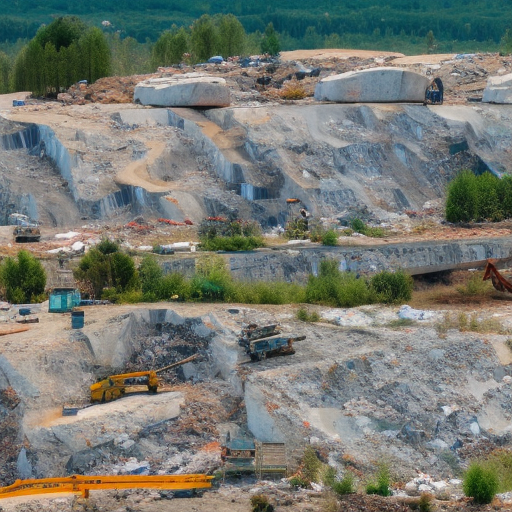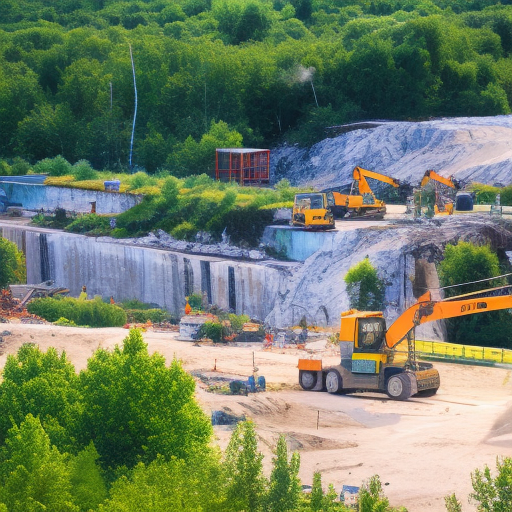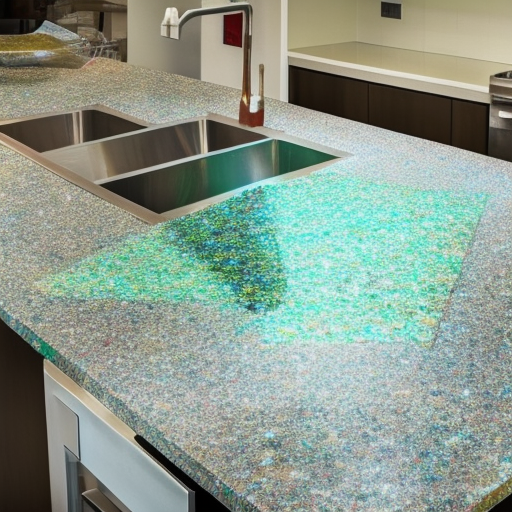In recent years, granite countertops have become a popular choice among homeowners due to their durability, aesthetic appeal, and perceived eco-friendliness. However, there is a growing concern about the environmental impact of granite countertops and whether they truly live up to their eco-friendly reputation. This article aims to provide a comprehensive analysis of the environmental impact of granite countertops, explore the facts and debates surrounding their eco-friendliness, and offer insights into sustainable alternatives. By understanding the true environmental impact of granite countertops, homeowners can make informed decisions and navigate the green choice for their kitchen or bathroom renovations.
1. “Understanding the Environmental Impact of Granite Countertops: A Comprehensive Analysis”

Granite countertops have long been a popular choice among homeowners due to their durability, aesthetic appeal, and perceived natural beauty. However, it is essential to understand the environmental impact of using granite as a countertop material. This comprehensive analysis aims to shed light on the various aspects that contribute to the environmental impact of granite countertops and evaluate their eco-friendliness.
One of the primary environmental concerns associated with granite countertops is the extraction process. Granite is a natural stone that is quarried from the earth’s crust, often requiring significant amounts of energy and resources to extract. This process involves the use of heavy machinery, explosives, and sometimes even the displacement of flora and fauna in the surrounding areas. Additionally, the transportation of granite from quarries to manufacturing facilities and then to the end consumers also contributes to its overall carbon footprint.
Another aspect to consider is the energy consumption during the manufacturing and processing stages. The transformation of raw granite into polished countertops involves cutting, shaping, and polishing, all of which require energy-intensive machinery and tools. The use of water for cooling and dust suppression during these processes further adds to the environmental impact.
Furthermore, the emissions of volatile organic compounds (VOCs) during the fabrication and installation of granite countertops should not be overlooked. VOCs are chemicals that can be harmful to human health and contribute to air pollution. While the emission of VOCs can vary depending on the specific granite and fabrication techniques used, it is crucial to consider these potential impacts.
On the other hand, granite countertops offer several eco-friendly qualities that should be acknowledged. Firstly, granite is a natural material that is abundant in the earth’s crust, making it a renewable resource. Additionally, granite countertops have a long lifespan, often lasting for decades with proper maintenance. This durability reduces the need for frequent replacements, minimizing waste generation.
Moreover, granite is a non-toxic material that does not emit harmful substances into the air or water once installed in a home. This aspect ensures a healthier indoor environment for homeowners and contributes positively to overall air quality.
To minimize the environmental impact of granite countertops, several sustainability measures can be taken. Opting for locally sourced granite reduces the carbon footprint associated with transportation. Additionally, choosing fabricators and manufacturers that adhere to eco-friendly practices, such as recycling water and properly disposing of waste, can further mitigate environmental harm.
In conclusion, the environmental impact of granite countertops is a complex subject that involves various factors. While the extraction, manufacturing, and transportation processes contribute to their carbon footprint, the durability, renewability, and non-toxic nature of granite countertops offer some eco-friendly qualities. By considering sustainable practices and making informed choices, it is possible to minimize the environmental impact of granite countertops and create a more eco-friendly kitchen or bathroom space.
2. “Evaluating the Eco-Friendliness of Granite Countertops: Facts and Debates”

Granite countertops have long been a popular choice for homeowners due to their durability, beauty, and perceived value. However, as environmental concerns have become more prominent, the question arises: are granite countertops eco-friendly?
To evaluate the eco-friendliness of granite countertops, it is essential to consider various factors and understand the facts and debates surrounding their environmental impact. Here are some key points to consider:
1. Extraction Process: Granite is a natural stone that is mined from quarries around the world. The extraction process involves cutting large blocks of granite using heavy machinery, which consumes significant amounts of energy and releases carbon emissions. Additionally, the extraction process can cause habitat destruction and soil erosion in the surrounding areas. However, some quarries have implemented sustainable practices to minimize their environmental impact.
2. Energy Consumption: The production of granite countertops involves several stages, including cutting, polishing, and transportation. These processes require substantial amounts of energy, which may come from non-renewable sources, contributing to carbon emissions and pollution. However, advancements in technology and manufacturing practices have led to more energy-efficient methods in recent years.
3. Durability and Longevity: One of the key eco-friendly aspects of granite countertops is their durability and longevity. Granite is known for its resistance to scratches, heat, and stains, making it a long-lasting material. This durability reduces the need for replacement or repairs, minimizing waste generation and the overall environmental impact.
4. Chemical Treatments: Some granite countertops may undergo chemical treatments to enhance their appearance or increase their resistance to stains. These treatments may involve the use of sealants or adhesives that contain volatile organic compounds (VOCs), which can be harmful to human health and contribute to air pollution. However, eco-friendly alternatives such as water-based sealants are available, reducing the environmental impact.
5. Recycling and Reuse: When granite countertops reach the end of their useful life, they can be recycled or repurposed, reducing waste generation. Recycling granite involves crushing it into smaller pieces and using it as a base material for roads or as aggregate in construction. Additionally, granite remnants from countertop fabrication can be repurposed for smaller projects like cutting boards or coasters.
The debate surrounding the eco-friendliness of granite countertops continues. While some argue that the energy-intensive extraction and production processes make them less environmentally friendly, others emphasize their durability and recyclability as significant advantages. Ultimately, the eco-friendliness of granite countertops depends on various factors, including the specific sourcing, manufacturing practices, and responsible disposal.
As consumers, it is crucial to make informed choices by considering not only the environmental impact but also other aspects such as durability, maintenance requirements, and personal preferences. Additionally, seeking out suppliers and manufacturers that prioritize sustainable practices and offer eco-friendly alternatives can contribute to a more sustainable countertop industry overall.
3. “Granite Countertops and the Environment: Navigating the Green Choice”

Granite Countertops and the Environment: Navigating the Green Choice
When it comes to choosing countertops for our kitchens or bathrooms, many of us are concerned about the environmental impact of our choices. Granite countertops have gained popularity due to their durability, beauty, and timeless appeal. However, it is important to consider whether granite countertops can truly be considered eco-friendly.
Granite is a natural stone that is formed deep within the earth’s crust over millions of years. It is harvested from quarries all around the world and then cut into slabs to be used as countertops. The extraction process of granite does have some environmental implications. Large machinery, such as excavators and trucks, are used to remove the granite from the quarry, which can contribute to air and noise pollution. Additionally, the process of cutting and finishing the granite slabs requires energy and water, both of which have environmental impacts.
However, it is essential to note that granite is a non-renewable resource. Once a quarry is depleted, it cannot be replenished. This raises concerns about the long-term sustainability of using granite countertops. However, compared to other countertop materials such as laminate or concrete, granite is known for its longevity and durability. A well-maintained granite countertop can last for decades, reducing the need for replacement and minimizing the environmental impact of production.
Moreover, granite is a natural material that does not emit harmful chemicals or volatile organic compounds (VOCs) into the air. This makes it a healthier choice for indoor environments, as it does not contribute to indoor air pollution. Granite countertops are also resistant to heat, scratches, and stains, reducing the need for harsh chemicals or frequent cleaning, which can be detrimental to the environment.
To make a more eco-friendly choice when it comes to granite countertops, consider opting for locally sourced or reclaimed granite. Locally sourced granite reduces the carbon footprint associated with long-distance transportation. Reclaimed granite, which is salvaged from old buildings or countertops, gives new life to a material that would otherwise end up in landfills.
In conclusion, while the extraction and production processes of granite countertops do have some environmental impacts, they can still be considered a relatively eco-friendly choice compared to other countertop materials. By opting for durable granite countertops and considering locally sourced or reclaimed options, you can minimize the environmental impact of your choice while enjoying the beauty and functionality that granite offers.
4. “Sustainable Options: Exploring Eco-Friendly Alternatives to Granite Countertops”

Sustainable Options: Exploring Eco-Friendly Alternatives to Granite Countertops
While granite countertops are a popular choice for many homeowners due to their durability and natural beauty, it’s essential to consider the environmental impact associated with their production and extraction. Fortunately, there are several sustainable alternatives to granite countertops that can be equally as stylish and eco-friendly.
One such option is recycled glass countertops. These countertops are made from recycled glass bottles, windows, and other glass materials, reducing the amount of waste that goes into landfills. The glass is crushed, mixed with a binding agent, and then heated to create a durable and attractive countertop surface. Additionally, using recycled glass countertops helps conserve natural resources, reduce energy consumption, and limit carbon emissions.
Another environmentally friendly alternative is bamboo countertops. Bamboo is a rapidly renewable resource that regenerates much faster than traditional hardwood trees. It grows abundantly and can be harvested in just a few years, making it an excellent choice for those seeking a sustainable option. Bamboo countertops are also highly durable and resistant to moisture, making them suitable for kitchen use. However, it’s important to ensure that the bamboo is certified by reputable organizations such as the Forest Stewardship Council (FSC) to guarantee responsible and sustainable sourcing.
For those looking for a more natural and rustic option, butcher block countertops made from sustainably harvested wood can be an excellent choice. These countertops are typically made from reclaimed wood or wood from responsibly managed forests. By using wood that has already been harvested or ensuring that the wood is sourced sustainably, you can minimize the environmental impact associated with deforestation. Additionally, butcher block countertops can be sanded and refinished, extending their lifespan and reducing waste.
Concrete countertops are another eco-friendly alternative to granite. Concrete is a versatile material that can be mixed with recycled aggregates such as fly ash or slag, reducing the need for virgin materials. Additionally, the long lifespan of concrete countertops reduces the need for replacement, further decreasing waste. However, it’s crucial to ensure that the concrete used is free from harmful additives and sealers to maintain its eco-friendly status.
When considering eco-friendly alternatives to granite countertops, it’s essential to evaluate not only the materials used but also the manufacturing processes involved. Look for certifications such as Cradle to Cradle or GreenGuard, which indicate that the products meet specific environmental standards.
In conclusion, while granite countertops offer durability and visual appeal, their environmental impact should not be overlooked. By exploring sustainable alternatives such as recycled glass, bamboo, butcher block, or concrete countertops, homeowners can make a positive impact on the environment while still enjoying a beautiful and functional kitchen space.




